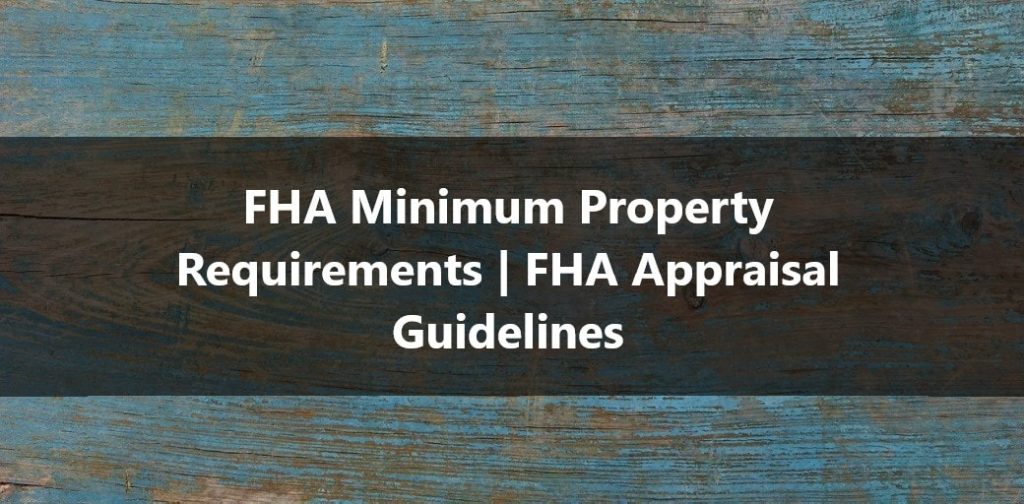FHA Minimum Property Requirements | FHA Appraisal Guidelines
Are you looking for FHA minimum property requirements? When refinancing or purchasing, understanding FHA appraisal guidelines can be cost effective by preventing paying for an additional inspection. FHA appraisal requirements are clear and a checklist can help with understanding FHA appraisal standards.
FHA Appraisal Guidelines – Defective Conditions of a Property
Factors that may cause a property to be ineligible for FHA financing cannot affect:
- The health and safety of occupants.
- Structural soundness of the dwelling.
- Collateral security.
When a home does not qualify or meet FHA appraisal guidelines, a property appraisal will be made “subject to” repairs. Reviewing FHA appraisal requirements can help you save money by knowing what needs to be repaired before ordering an appraisal.
FHA Appraisal Guidelines – Common Deficiencies
The subject property cannot have hazards that affect the livability, marketability, health and safety of occupants, or endanger the physical improvements.
Peeling paint, broken windows, and pending building violations can affect the safety and security of the occupants.
Cabinets and built in appliances, which are considered real property, must be present and operational.
Materials that are hazardous on site, leaking/worn out roofs – an appraiser must report if the roof has less than two years remaining lifetime.
Foundation and basement cannot be blocked or inadequate access with no evidence of water damage. Cracks and erosion that affect the structural soundness of the property can make the property ineligible.
The furnace and heating system must be able to maintain the building to a minimum of 50 degrees and operate without human intervention.
Inadequate strapping of a water heater will cause a property to fail inspection.
An appraiser will comment on evidence of prior fire damage, frayed or gnawed wiring, droppings or infestations, fallen or disconnected heating/cooling pipes, and signs of water damage.
Other FHA Appraisal Requirements
An encroachment can be an issue. For example, the subject properties garage or other improvement onto an adjacent property, utility easement, a neighboring garage, other structure, or improvement to be on the subject property may be a reason why a property may not qualify due to FHA appraisal guidelines.
Not having safe and adequate vehicular or pedestrian access from public or private street.
Flood zone – being in particular zones, such as a coastal area, Zone A, Special Flood Zone Area, Zone V, and insurance being not available in the community due under the National Flood Insurance Program (NFIP).
Crawl spaces must have floor joists being sufficiently above ground and if there are any system components the vertical clearance needs to be 18 inches. Also needs to be free from trash, debris, vermin, not be excessively damp or pooling water.
Electrical systems – electrical switches need to function with no presence of sparks or smoke from the outlets. Also needs sufficient circuits in the service panel with no exposed, frayed or unconnected wiring throughout the home may be a reason why a property may not qualify due to FHA appraisal guidelines.
The plumbing system must have sufficient water pressure and hot water. The toilets cannot have presence of leaks and must be functional. The sink, bathtubs, and showers must not have pipe leaks.
Other factors that affect the safety, soundness, or collateral security.
FHA Minimum Property Requirements – Appraiser Competency
Appraisers must understand, be aware, and correctly employ the methods and techniques to produce a credible appraisal. Being knowledgeable of the Uniform Standards of Professional Appraisal Practice (USPAP) and FHA appraisal requirements are required before accepting an assignment. An appraiser needs to be knowledgeable in the area where the home is located.
Manufactured Home Requirements for FHA Loans
A lot of borrowers struggle finding financing for a manufactured home, but we have access to manufactured home loan programs. A manufactured home must be built after June 15, 1976 and never occupied at any other location. A licensed local engineer must certify the foundation and the foundation must be in compliance within the permanent foundation guidelines for manufactured homes.
When is an engineer certification not required for an FHA loan?
- FHA/HUD Real Estate Owned (REO) sales.
- FHA streamline.
- When a home is not manufactured housing.
Borrowers may qualify for an FHA loan, but the property needs to qualify too. Talk to your Loan Originator before ordering an appraisal if there are any concerns with the property condition. In some cases, ordering an inspection can be cost effective.
There are other options for financing for properties that do not meet FHA minimum property requirements.
FHA 203k Loan
An FHA 203k loan is an option when a property does not meet FHA minimum property requirements, which allows borrowers to finance repairs.
Financing for Improvements and Other Options
The FHA Standard 203(k) and FHA Limited 203(k) allows borrowers to finance repairs that may cause a property to be ineligible for a standard FHA loan. Another option would be applying for a conventional loan because conventional appraisals are more lenient than FHA appraisal requirements. Conventional loans have stricter guidelines than FHA loans when it comes to credit and income.
A Loan Originator can assist you with concerns on FHA appraisal standards, but an appraiser will note any deficiencies with the subject property.
